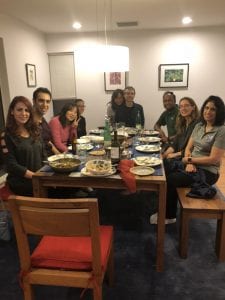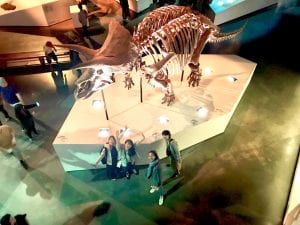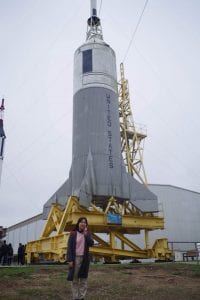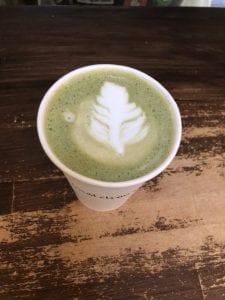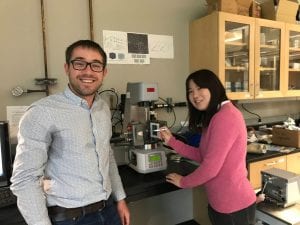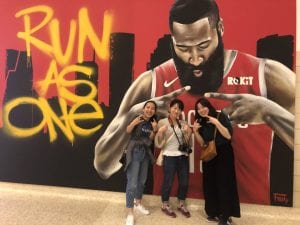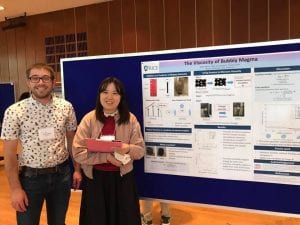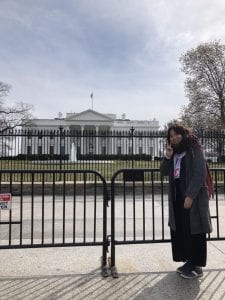[:en]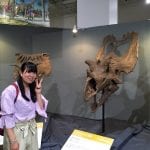 Kyoko Ikeda
Kyoko Ikeda
Hometown in Japan: Kagoshima
University in Japan: Kyushu University
Major & School Year: Earth & Planetary Science, B3: Junior
Host Advisor: Prof. Helge Gonnermann, Dept. of Earth, Environmental, and Planetary Sciences
Host Lab: Gonnermann Lab: Volcanoes, Magmatic Processes, and Fluid Flow
Research Project: “The Viscosity of Bubbly Magma”
Why TOMODACHI STEM @ Rice University?
My dream is to work overseas as a scientist who predicts volcanic eruptions. To realize my dream, this program will give me valuable opportunities. First, I’ll be able to experience earth science research at Rice University and work alongside the many great scientists and students there. By talking about their school life and future goals, I will be able to know and feel their spirits and this will increase my motivation as a scientist. Second, I can learn academic skills like how to highlight and build on message and communicate about my research in this program. These skills will be of great use in my future. After this program, I’ll plan to continue to participate in international research. I’ll hope to become a bridge between Japan and foreign countries in the field of earth science in the future.
Goals
- To learn how to research and how to communicate about my research.
- To make a lot of friends with people at Rice University.
- To go to many kinds of museums and learn more about culture.
TOMODACHI STEM: Post Program
- My favorite experience in the U.S. was… going to museums.
- Before I left for the U.S. I wish I had… more opportunities to speak in English.
- While I was in the U.S. I wish I had… eaten a lot more tacos!
Excerpts from Kyoko’s Weekly Reports
- Week 01: Arrival in the U.S.
- Week 02: First Week at Research Host Lab
- Week 03: Interview With a Female Researcher
- Week 04: Research in the U.S. vs. Research in Japan
- Final Research Poster Presentation
- Week 05: Final Week on the East Coast
- Final Report
Week 01: Arrival in the U.S.
I was surprised at two things when I arrived in Houston. One was how friendly people are in the U.S. When I take the shuttle bus, the driver always talks to me about things like where I am from, which hamburger shop he recommends to me, and so on. In Japan, I have never talked with a bus driver. In an elevator, the same thing happens. I learned that American of use small talk with stranger to show friendliness and that they mean no harm. The other thing is there are a lot of public art exhibitions at Rice University. Walking around the campus, I found a piece Berlin Wall. I wonder how they got here. I also saw a statue of the founder of university and this was similar to what I would see at universities in Japan.
The first week, I took a class about how to communicate in English. Before I left Japan, I only leaned about grammar and vocabulary. However, the most important thing to communicate in English is the accent and intonation. The words which I want to say should be pronounced strongly. Emphasizing important words allows listeners to understand easily.
This week, I also took part in a seminar on the relationship between volcanic eruptions and climate change. Unlike in Japan, students sit down surrounding the professor. That enables them to ask questions easily. What surprised me was that they do not hesitate to say, “I do not understand.”. I cannot say such a thing, because I started to become anxious that my classmates might think of me as a stupid person. However in the U.S, professors try to explain concepts more easily until every student can make sense of the concept. Discussions between students and professor will lead to better understanding b everyone and an increase in their curiosity.
On Friday night, I was invited to my professor’s home for a party. I could not imagine what a party at a home is like because I have only seen this in movies so that I was a little nervous. As soon as the party begin, I forgot to feel nervous and got very excited. We sat on the chairs and ate Indian food. Food was served for both vegetarians and non-vegetarians. In order to protect the life of animal, vegetarians do not eat meat. I noticed that there are many kinds of people and we have to respect each other. During dinner, we talked a lot about politics, religion, and race. It reminded me that world is wider than I expected. I had really good time in the home party.
This weekend, I enjoyed spending time at the Houston Museum of Natural Science. There were a lot of exhibitions on oil, minerals, dinosaurs, history, fossils, and more. I especially enjoyed the oil-related and dinosaur-related exhibitions. Although it is easier to get oil than before we still need high technology to dig deep enough to reach oil reserves. What I was most excited was to see the dinosaur center including dinosaurs and fossils. Little did I expect that Triceratops have skin hair which was just decoration. It shocked me because it looked a little bad. Furthermore, this museum is also famous for Trilobite which is similar to pill bugs. As the time past, they changed their body structure little by little. From their body structure, we can predict the exact period of time that fossil had been alive.
There are many differences between Japanese museums and American ones, but I think the most different point is the curators who study about their exhibits and preserve them. In Japan, in most museums there are few exhibit guides. In the worst case, there are no guides in museums. However, in the U.S, there are two or more curators in each space. It helps visitors to ask questions and increase their knowledge. For example, I asked a curator if there is Opabinia. He showed me around and taught me a lot. I am very satisfied with his explanation.
Initial Reflections on Intercultural Experiences in the U.S.
One of the U.S. core values is “to be assertive”, which means people express their ideas clearly to make others understand their idea. I have one example of this. On Friday night, I attended a party at my professor’s home. After dinner, we discussed whether it is better for governments to invest in industry in order to make the country develop or to invest in social welfare and infrastructure in order to make their life generous. One person insisted that government should invest in infrastructure because we cannot live without water, gas, and electronics. He said governments should make safe water a priority since many children have died because of unsafe water. On the other hand, other people claimed that if the country is industrialized, the country can earn much money and the government can use this money to keep invest in its people and infrastructure. The two people had opposite idea but they started discussing. Finally, they understood each other’s perspective and respected each other. In Japan, when such things happen, I would say, “Both ideas are true, let’s talk something different.” and change the subject in order not to destroy the mood. Japanese people prefer enjoying time rather than making others understand their idea. However, American people keep telling their idea until they understand each other. That is a big difference between Japan and the U.S.
I do not have confidence in my English skills so it is difficult for me to make new friends in the U.S. I know that I do not have to speak perfect English, but I am anxious about if I can make myself understood in English and tend to keep silent in conversations. However, I am a positive person so that I can recover soon. In order to make foreign friends, I believe they are kind enough to wait until I start speaking. Besides, if they do not wait, I think today is special and they are too busy to talk with me. I will speak to them another time. Before I speak to foreign people, I will remind myself of these things.
I need to make a good relationship with foreign people because I think communication is the most important thing in international research. We are likely to misunderstand each other in English since we sometimes have misunderstandings even in Japanese. The first step is that I try to express my ideas clearly. Japanese people often say, “maybe Yes”, but foreign people do not know whether” Yes” or “No”.
Preparing for Research and First Few Days in the Lab
In January, I talked with my mentor, Tom, via Skype. We discussed what the topic of my project would be and he recommend me to read two papers. It was difficult for me to understand, so I asked some questions to my lab members in Japan. The first day of my research, I decided the topic of my study more clearly and made a schedule. My study will focus on the Capillary number through which we can know the shape of bubbles in magma and control magma viscosity by experimental means. This study is needed to better understand the mechanism of eruptions. This week, I learned how to use a machine which can measure viscosity. This machine is very sensitive so that I have to pay carefully attention. Moreover, I read papers about capillary number and learned more about this topic.
Return to Top
Week 02: First Week at Research Host Lab
There are three differences I’ve noticed between a U.S lab and Japanese lab: time, the set-up of the research room, and lab meeting. When it comes to time, everyone comes in whenever they like in my U.S lab. One comes to the lab at 6:00 AM, but the another comes to the lab at 11:00 AM. That means what time you research depends on what time you can work the most efficiently. On the other hand, I heard that many labs in Japan have core time during which students must study and work/be in the lab. Core time helps us know what research the other people in our group are doing and we can ask each other when we have questions.
Second, it is common for Japanese labs to all sit together and do research with other lab member in one big room. In the U.S, instead of having a big research room, there are many small rooms in which there are two or three members. The first time I visited my U.S lab, I wasn’t sure which students were actually members of my lab as everyone sat in different rooms.
Third, there are no lab meetings in my U.S lab. This was a big surprise to me. Each person has a meeting with their professor and talks about their research. So I had no chance to know what the other person’s research is about. However, my department holds a lunch time seminar during which postdoctoral researchers talk about their research while the others eat pizza once a month. In Japan, we have lab meeting once a week and we get some advice not only from the professor but also from other students.
Communicating in English is difficult but interesting for me. When I was talking with my professor he suddenly knocked on the desk. It was a very surprising experience for me because I thought that he was angry with me. After that, my mentor and professor were laughing. I did not know what had happened and I remained silent. My professor told me that knocking the table meant that everything was going well. So, next time when I knock on the table, I can laugh with them.
This week, I learned some of the most important things for an academic. For the past week, I could not do experiments because I had hard time learning how to use the experimental machine. To tell the truth, I was disappointed in myself and wondered why I could not use my equipment when other people could. I asked my professor to teach me how to use equipment, but he said the following words, “Most academic spend long time on setting up their equipment. If you are satisfied with machines made by someone else and do experiment routinely, are you really fulfilled? We are excited when we are researching about things not known, aren’t we?” This made me realize that the motivation for doing research is to do something that no one else can do. Research is a like marathon, we cannot always see the goal but if we continue running, we can finally reach the goal. Sometimes, it is fine to take a walk or take a rest. We are still going forward unless we give up.
This weekend, I went to NASA Johnson Space Center! This is where they train astronauts and where the mission control center is. I took a tour to the training facility and rocket park. I really enjoyed rocket park since I could see the Saturn V which was used by the Apollo Program. It was too big to take a picture. Moreover, there were posters about each Apollo Program. What I was impressed by was Apollo 11 which is when Neil A. Armstrong landed on the moon. His famous words where shown on this poster, “Houston, Tranquility Base here. The Eagle has landed.”. I imagined how people in the Houston control center must have been delighted by hearing his word. The history of space development in the U.S has not always gone smoothly, but finally they achieved their goal. Saturn V reminds us of their passion for space.
Research Project Update
Magma is similar with coke in that it is consists of liquid and bubbles. My research focus is on the bubbles in magma. However, you cannot see magma directly, so I use pumice from which I can record the ratio of bubbles in the magma. By using a high temperature machine, I can transfer pumice into magma and observe how it changes. My research will lead to better understanding the mechanism of magma.
Week 03: Interview With Female Researchers
I interviewed a female professor whose research focuses on environmental problems ranging from soil, to the atmosphere, to oceans. She studied math and physics as an undergraduate because she enjoyed solving problems. Particularly, she found it satisfying when she solved math problems. She got a Master’s in Environmental Science after her Bachelor’s because she wanted to apply her math background to something environmental. However, she did not decide what kind of environmental research she wanted to. After two years of her M.S. degree, she realized that she really wanted to study environmental problems on a global, not local, scale. Therefore, she moved from the University of North Carolina, Chapel Hill to the University of California, Irvine. She had thought she would study soil science or atmospheric science there, but unexpectedly discovered that she really liked oceanography. So, she got a Ph.D. in Chemical Oceanography with a focus on using carbon isotopes to study the carbon cycle. After, she did a Postdoc at Lawrence Livermore National Lab (LLNL), the facility where she had sent her samples to be analyzed, she noticed that she also enjoyed studying soil and rivers. She went through a second postdoc after that to explore her interests in global ecology and then got a faculty position at Rice.
I asked her what do you think of being woman scientist. She felt lucky to be a woman scientist now because it is much easier now than it was in the past. She does not feel that her coworkers are biased against her, however, she sometimes has felt that women and underrepresented minorities face difficulties in the work place. For example, as is often the case with oceanographic research ships, there are were no restrooms for women before the 1980s. However, such structural problems have improved little by little. She thinks that we have to make the work place comfortable, not only for women but also for other minorities.
Thanks to prior women, I can work more comfortably than before. So, I think such a small effort of woman will lead to making the work place easier to work regardless of whether you are a man or woman.
I also interviewed a Master’s student who was also an exchange student from Japan. She worked in a company as soon as she graduated high school. After that she entered university because she wanted to study aerospace. While she was a Master’s student, she came to Rice as an exchange student. She got her Master’s degree this spring in Japan and she will work as an engineer in a Japanese company. I asked her what do you want to be in the future. Her answer was “I want to be a strong mother who works hard both as a mother and as an engineer. After working in the company as an engineer, I want to get a PhD and pursue a career in academia.” Woman sometimes have to choose between becoming a mother or continuing their job. These days, society support does not provide woman enough to support to continue working but it is changing at this moment. If women want to have both a family and job, her work place and her family will need to help her.
Reflections on the Interviews
From these two interviews, I think it is difficult for women to chase their dreams on their own effort alone because there are environmental problems such as work place and families that can be barrier to career progression. However, thanks to prior woman, the situation around working women is improving now. If I desire for my dream come true, many people around me will have try to understand my dream and help me. I believe that the day will come when everyone can work comfortably regardless of gender.
Research Project Update
For the past two weeks, my mentor and I had a hard time learning how to use the machine but, finally, we figured it out and got some data. I felt a sense of accomplishment like when the cloud covered sky suddenly changes and the light of the sun shines through. However, it was a just the start line to get some data in our research process. The end of this week, I had to think how to analyze my data because it depends on my way to analyze if my data will be meaningful or not. I tried many kinds of data analysis, but I still did not know the answer. I am looking forward to reaching the answer next week.
Week 04: Research in the U.S. vs. Research in Japan
Through this research experience, what I am able to do has increased more and more. The most helpful skill I developed was how to code in MatLab Before I came here, I had never used MatLab. However, my professor recommended that I learn how to use it because it is useful to analyze data. I was not confident in my programing skills, but I tried. I looked up how to use MatLab via the internet and books. In addition, my friend who is good at writing code often helped me. Thanks to her help, I managed to analyze my data by using my MatLab code. I think it is important to try everything even if it is new and I am not confident in my skills. I cannot polish my skills without trying.
The bigger difference I see between the U.S lab and Japan is the overall education system. In Japan, everyone in the lab helps someone who is having trouble. So, it is natural for them to get help without needing to ask for it. However, in the U.S lab, I have let people know I am having trouble and ask for their assistance. If I don’t ‘speak up’ they will assume everything is okay. There is also a difference in conversational style. Japanese people depend on context during conversations. So, sometimes this can lead to misunderstandings when working abroad. For example, if we ask “Can I please finish it by Monday, I have a plan to go to Kyoto this weekend.” That means it is impossible for us to work on it this weekend. However, people in the U.S may think so what? They may think you are able to finish it by Monday or not. So we have to clearly say Yes or No.
Final Research Poster Presentation
The title of my research project is “The Viscosity of Bubbly Magma”. My host professor is Helge Gonnerman and my mentor is Thomas J. Jones. They always encouraged me. Many scientists study how fast magma ascends in the conduit to predict when the volcano will erupt. The first step to predict eruption and to do this I researched the viscosity of bubbly magma. However, it is impossible for us to get magma directly, so that I used two types of pumice which came from solidified magma. I used two machines, one measured the real volume of the pumice and the other measured the viscosity. My results showed that the viscosity of bubbly magma is variable. In order to explain the variable viscosity, I estimated that there are two reasons – difference in the volume fraction and the changing of the bubble shape. I compared the ideal equation which expresses the relationship of the bubble fraction and changing bubble shape with my data. It showed that the equation cannot be always used. Future work will focus on measuring more samples and making a new, more accurate equation.
Week 05: Final Week on the East Coast
At the beginning of our final week, we traveled to Philadelphia, the city where America was founded. Before becoming the United States, it was comprised of 13 colonies under British rule and the American Revolutionary War was fought to seek it’s independence. Thomas Jefferson and Benjamin Franklin held a meeting with the leaders of the 13 colonies of what would become the U.S. They talked with each other and recognized that they needed to declare their independence from the U.K. They the developed the Declaration of Independence starting with “All men are created equal.” and “We have it in our power to begin the world over again.” I saw these words when we visited Independence Hall. I felt we are not satisfied with the limits on our freedoms; we have to pursue true freedom. So, we have responsibility to the freedom of others.
In the middle of week, we moved to Washington D.C and visited the Lincoln Memorial. It was created in 1992 and more than 50,000 people attended the opening ceremony. The below words are written on the wall. “Government of the people by the people for the people shall not perish from the earth” These words highlight America’s fight to remain a democracy and united country during the Civil War. I think we have to make government useful for people and pursue this goal each day to make such government.
Through this program, I learned what academia is. My host professor and mentor taught me the most important thing as an academic is to continuing researching and learning. We feel excited when we find unknown things. In other words, the process to explore unknown things make us real researchers. It is not an easy way to find new things. We sometimes have hard times finding the answers. However, we will keep going forward unless we give up. In addition, I also learned being a female researcher is not easy, but I can do it. Before this program, I had never thought of what it is like to be woman researcher. This is because I could only imagine the hard times or difficult feelings of female researchers. During our time visiting Lehigh University, I had the opportunity to talk with woman geologist. She said to me the following words; “You can pursue both being mother and being woman researcher. However, you have to make more of an effort more than other people. You have to be a person who everyone admires and respects. In addition, you also have to respect other people. In short, it is necessary for women to ask for help from other people if you want to become both mother and researcher.” I felt that it is difficult to work as an woman academia, but there are environments where people understand and respect my will and desire to be both a mother and researcher.
Final Report
Internships like the TOMODACHI STEM @ Rice University program are important for students because they help them make better and more informed choices for their future. When I went to Dow Chemical in the U.S., I asked the employees I met there why she or he got this job. Many people shared that when they were a university student they did an internship at a company or in a field where they wanted to work. Having finished their internship, they recognized that this job was not what they want to become. After that internship, they applies for another internship and they finally found the job/field that they wanted to work in. Like this story, there is sometimes a big gap between our dreams and reality. In order to know that gap, taking up the challenge of doing an internship (like TOMODACHI STEM) will enable students to rethink about their future career goals.
Although I learned many things from this program, I especially want to highlight three things. First, I made many friends who have completely different backgrounds with me and respect each other. For instance, there are ten females in our group and all different majors like physics, computer science, earth science, biology, chemistry. When we went to see dinosaurs at the Houston Museum of Natural Science, I was interested in when and where they lived because of my major, earth science. Little did I expect that my friends who majored in biology would also be curious about the use of this bone for various dinosaurs. As was often the case with like this many times, it gave me a new perspective.
Second, speaking English is important. Before I went to the U.S., many people told me, “You can communicate with foreign people without English.” It is true that I do not have to speak perfect English, but I had to try hard to convey my idea with all my effort through facial expressions and gestures instead of speaking English. Besides, I have to express clearly “yes” or “no” when speaking in English to not cause confusion. I think it is better to learn enough English so I can share my ideas clearly.
Third, challenging experiences are exciting. I often hesitate to try something new because I am anxious about failing. During my stay in the U.S., I challenged myself to try anything whether I like it or not. I sometimes failed, but I believed that through this varied experiences I learned a lot. Through this program, I had the opportunity to meet many people and it enabled me to broaden my perspective. Someday I want to be a bridge between Japan and foreign countries through what I have learned in this program.
Return to Top
[:]

